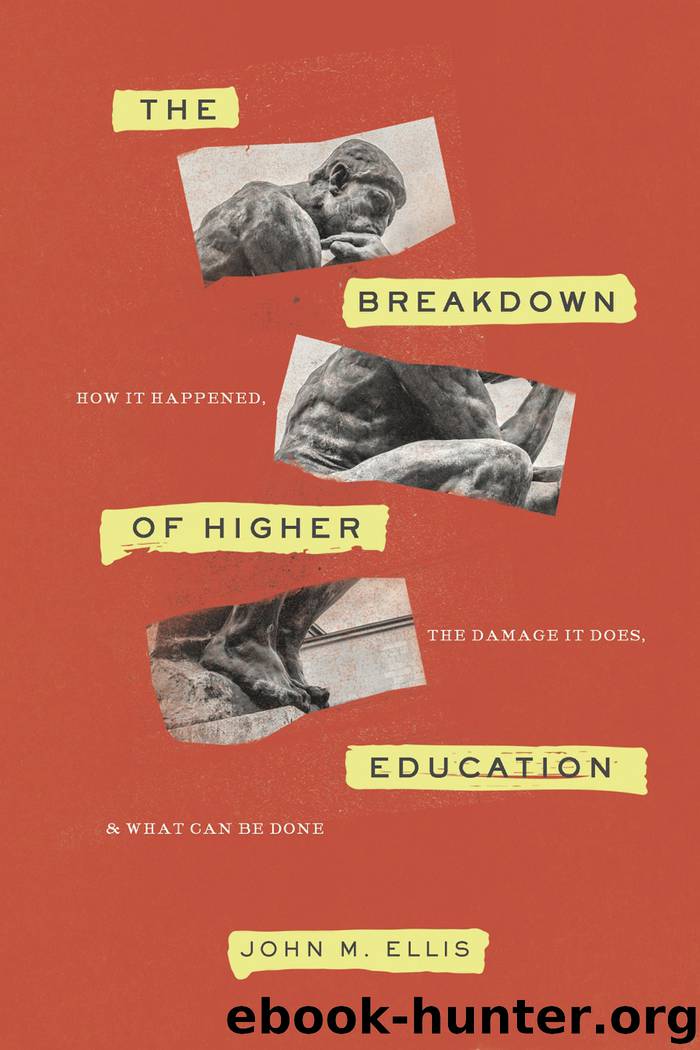The Breakdown of Higher Education by John M. Ellis

Author:John M. Ellis
Language: eng
Format: epub
Publisher: Encounter Books
Published: 2020-03-19T16:00:00+00:00
† In some accounts the wording of this chant was slightly different: “Western Culture’s got to go.” The wording in the text seems the most likely.
CHAPTER 6
The Wretched State of the Campuses
I began my career as a university teacher over fifty years ago. I remember well how cheerful it was at the beginning of each academic year to see eager young faces about to begin their university education, and to think that they would always look back fondly on this time as one that stretched their mental capacities and made them more thoughtful and knowledgeable people. It seemed to me a great privilege to be a part of that. More generally, I felt privileged to live among sharp and thoughtful colleagues who were explorers in their fields. They were open-minded because they could not be otherwise if they were to bring new light to old problems, an essential part of their job. It was their responsibility to get their students to think in that way too. A university was then an enterprise that was easy to believe in, and to be proud of.
Few people now have that same feeling. Where faculty were formerly open-minded explorers, they are now too often closed-minded zealots. Where once the general impression of life on campus was of thoughtfulness, intelligence, and an eagerness to learn, what stands out now are episodes of extraordinary foolishness.
In the past, virtually everyone agreed that universities needed to be protected from political influence because it would corrupt them. That consensus is now gone. Today’s campuses are so predominantly and brazenly left-activist that nobody could regard them as politically neutral. The entire campus atmosphere is openly political, and radical proselytizing is central to campus life. Certain ideas may be expressed freely; others may not, because they offend campus orthodoxy. As a consequence, the entire campus atmosphere is inhibited, uncertain, even fearful.
James Freeman reports the results of a study finding that a majority of students said that their professors or instructors “have used class time to express their own social or political beliefs that are completely unrelated to the subject of the course.”1 Professors are evidently making their political views part of the classroom climate, and a majority of students said they felt intimidated about expressing views different from those of their professors. Thinking for oneself in these classrooms is clearly felt to be dangerous. College classrooms, of all places.
But it’s not only instructors that students fear to offend; they even self-censor to avoid offending other students too. Frank Furedi reports on a survey published by the Harvard Crimson which found that “around two-thirds of students who were surveyed had ‘at some point chosen not to express an opinion in an academic setting out of fear that it would offend others.’ The survey indicated that 78 percent of registered Republicans said they ‘withheld opinions in class’ compared to 59 percent of registered Democrats and 73 percent of registered Independents.”2 This self-silencing goes well beyond the normal shyness of many students—it reflects a climate of fear in which students keep quiet about their beliefs for fear of retaliation.
Download
This site does not store any files on its server. We only index and link to content provided by other sites. Please contact the content providers to delete copyright contents if any and email us, we'll remove relevant links or contents immediately.
| Administration | Assessment |
| Educational Psychology | Experimental Methods |
| History | Language Experience Approach |
| Philosophy & Social Aspects | Reform & Policy |
| Research |
The Art of Coaching Workbook by Elena Aguilar(48045)
Trainspotting by Irvine Welsh(20046)
Twilight of the Idols With the Antichrist and Ecce Homo by Friedrich Nietzsche(17703)
Fangirl by Rainbow Rowell(7829)
Periodization Training for Sports by Tudor Bompa(7324)
Change Your Questions, Change Your Life by Marilee Adams(6637)
This Is How You Lose Her by Junot Diaz(5755)
Grit by Angela Duckworth(4730)
Red Sparrow by Jason Matthews(4655)
Asking the Right Questions: A Guide to Critical Thinking by M. Neil Browne & Stuart M. Keeley(4567)
Paper Towns by Green John(4165)
Room 212 by Kate Stewart(4099)
Ken Follett - World without end by Ken Follett(3968)
The Sports Rules Book by Human Kinetics(3582)
Housekeeping by Marilynne Robinson(3397)
The Motorcycle Diaries by Ernesto Che Guevara(3326)
Introduction to Kinesiology by Shirl J. Hoffman(3297)
Exercise Technique Manual for Resistance Training by National Strength & Conditioning Association(3289)
Double Down (Diary of a Wimpy Kid Book 11) by Jeff Kinney(3267)
